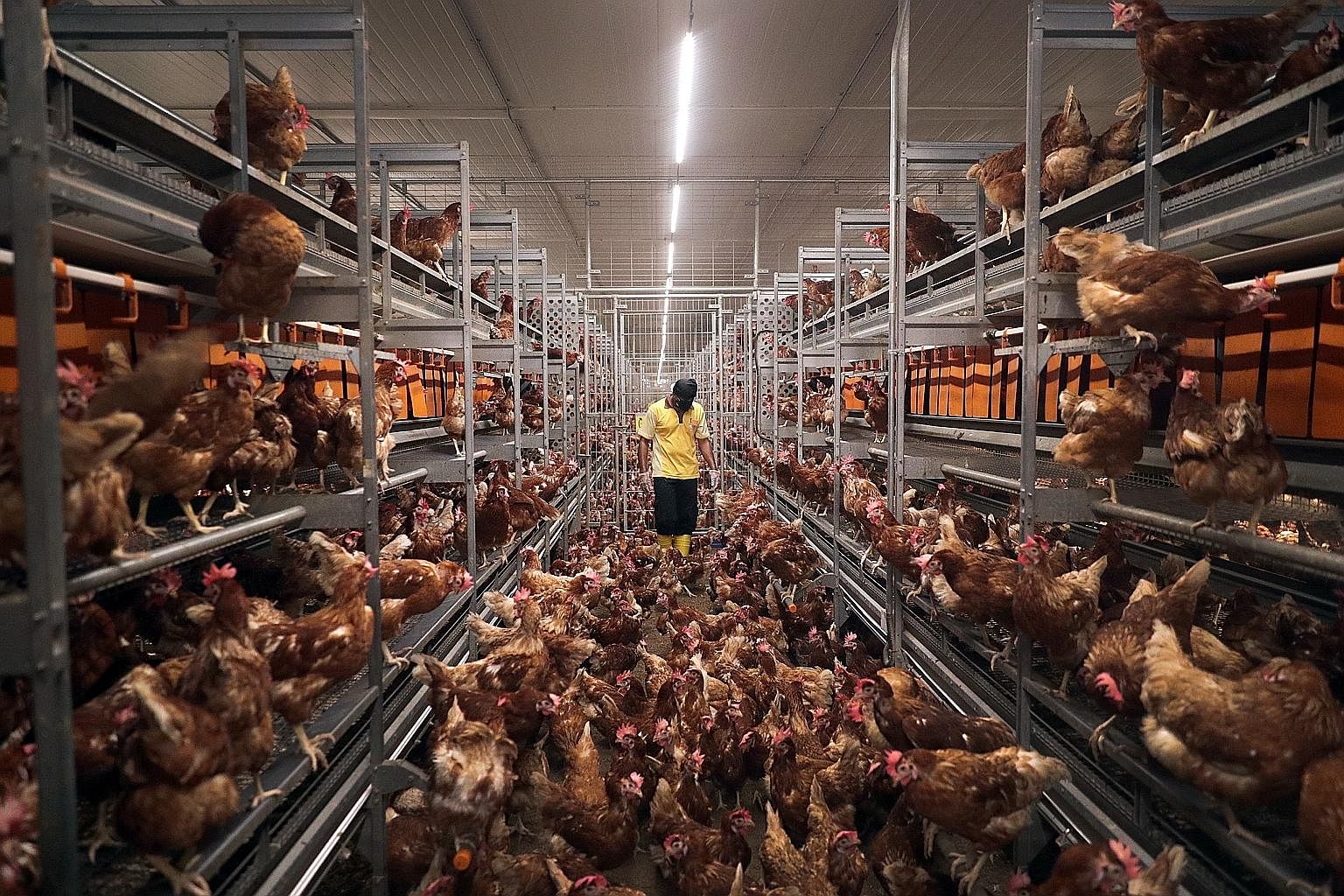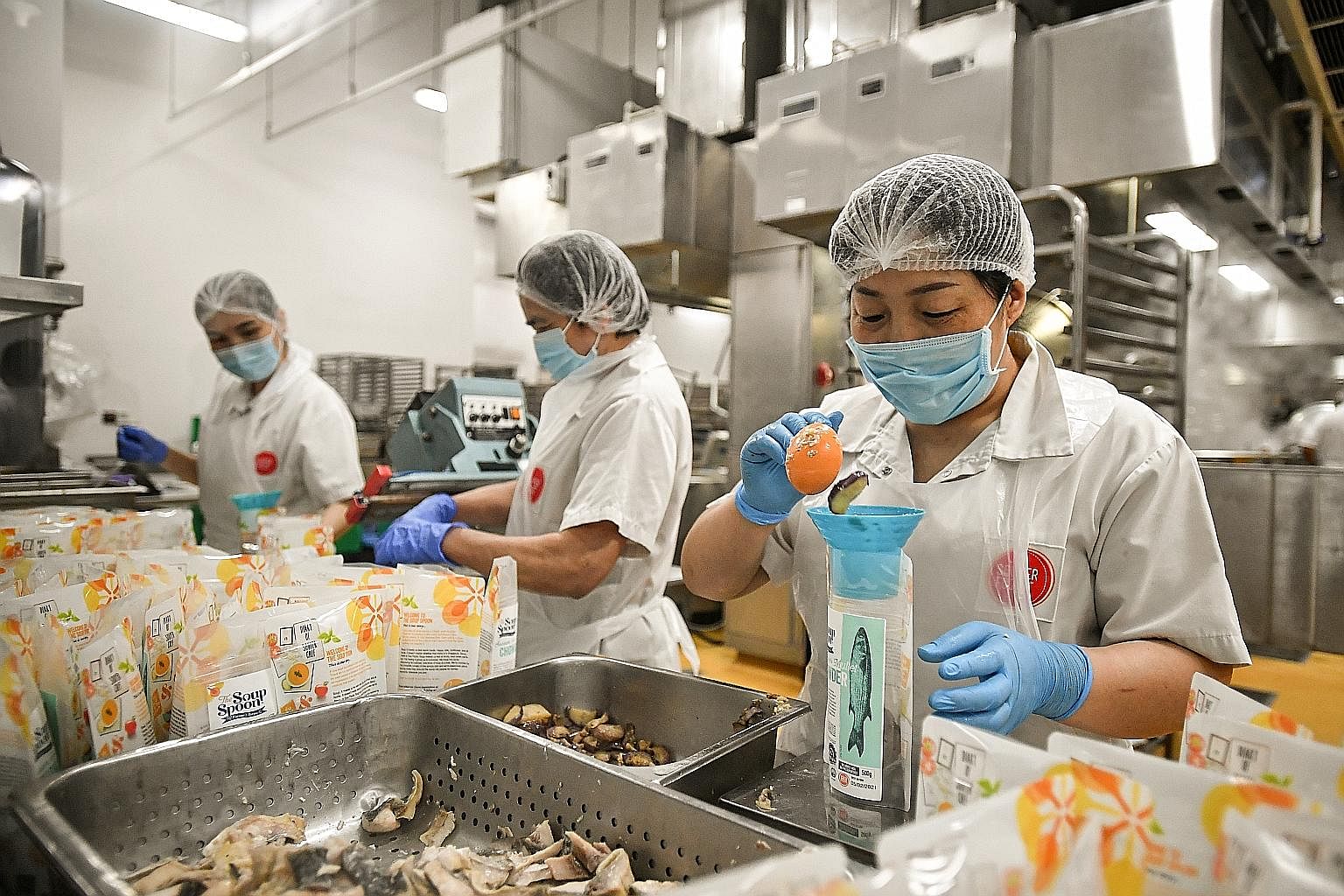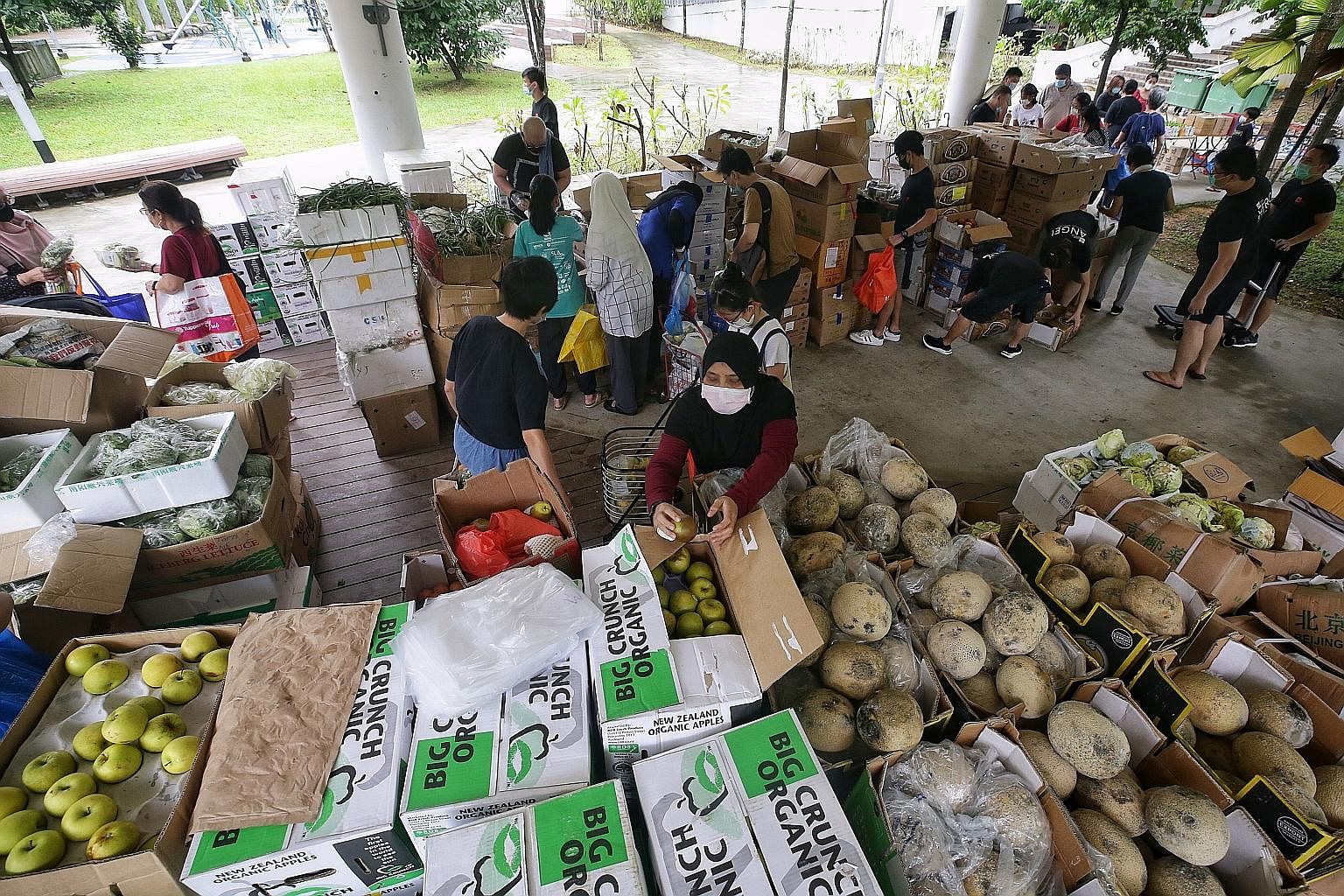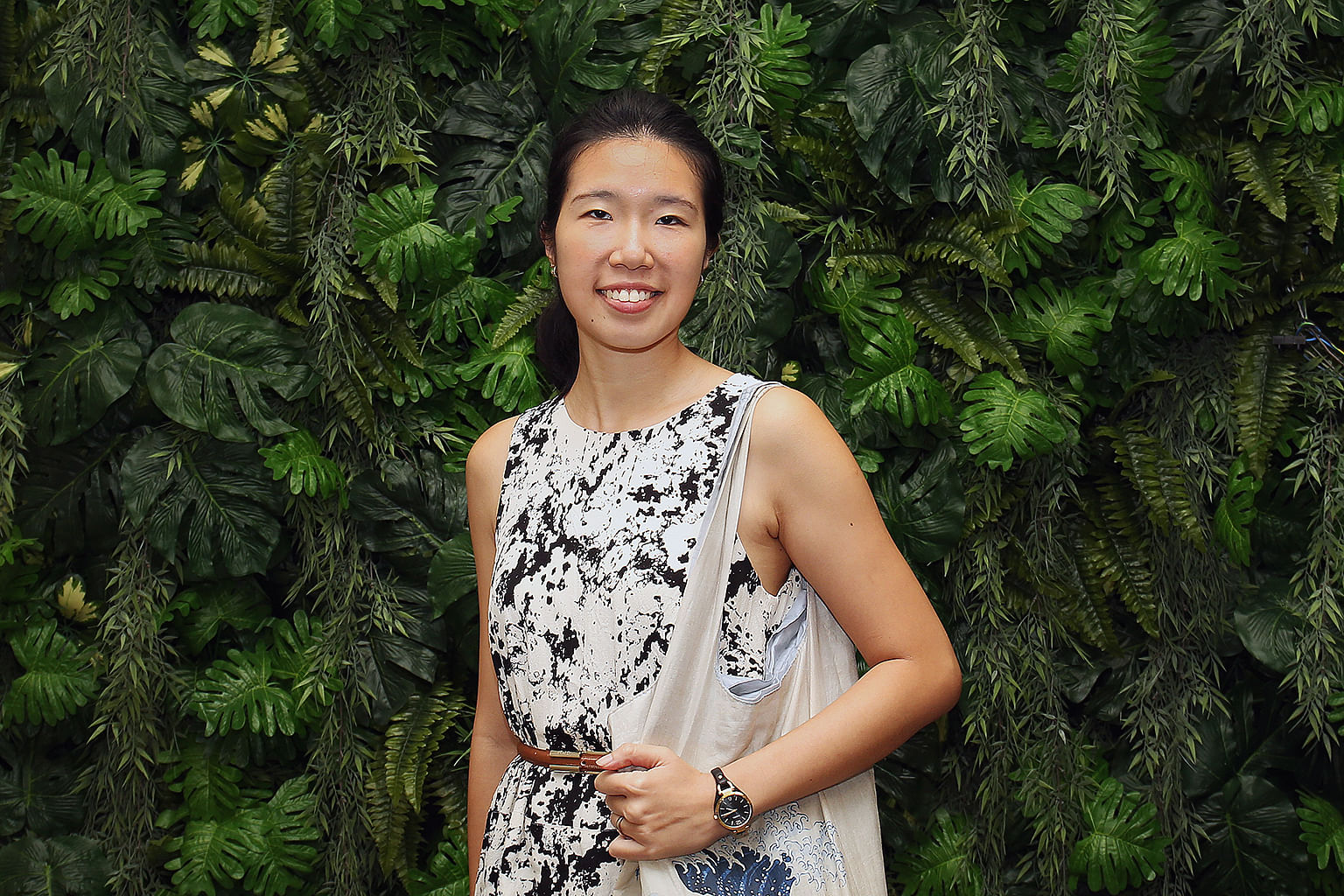Go on, ask yourself: How much money is thrown away through the food waste generated by households here every year?
The answer: $342 million.
If you were off the mark, well, you are not alone. Fewer than one in six got it right - just 16 per cent of respondents - in a Sunday Times poll of 1,000 residents, conducted by online market research firm Milieu Insight last month.
All other respondents underestimated the sum. And nearly everyone said his household threw out only small or "reasonable" amounts of food.
Respondents were asked 14 multiple-choice questions like the difference between "sell by", "use by" and "best before" dates, and how soon the Semakau Landfill would reach capacity.
Close to half - about 47 per cent - got fewer than seven right.
The findings underpin a six-part series by The Sunday Times, in partnership with DBS, to understand the scale of food waste in Singapore, and the efforts to tackle it by businesses, communities and individuals.
Commenting on the survey findings, Dr Augustine Quek, senior research fellow at the National University of Singapore's (NUS) department of chemical and biomolecular engineering, said: "As the survey shows, people do not believe they waste more food even though they are going to more buffets, catering more food than needed when hosting parties, and not taking away unfinished food when eating out."
Eating habits need to change in order to reduce food waste but Dr Quek, a former programme manager at NUS Environmental Research Institute, warned that social norms like this often take time to change.
The amount of food waste generated across the board yearly climbed steadily for much of the last decade and a half, jumping by 45 per cent from 558,900 tonnes in 2007 to 810,000 tonnes in 2017.
However, it fell to 763,000 tonnes in 2018 and 744,000 tonnes last year.

Ms Pek Hai Lin, executive director of nonprofit Zero Waste SG, attributes the downward trend to community-led food rescue operations and installation of eco-digesters - machines that turn food waste into useful by-products - in more malls and buildings.
Food waste is a huge problem not just because it adds to Singapore's only landfill - which is expected to be full by 2035 - but also because of the significant amount of resources and energy that goes into growing, processing and transporting food, said Ms Pek.
She added: "When you throw away a burger, you're not just throwing away the burger. You're throwing away energy, money, time and water. You're throwing away people's effort, blood, sweat and tears."
She said a huge part of food waste is generated upstream in the supply chain and comes from import excess and cosmetic filtering, in which food is thrown out if it has slight imperfections.
For instance, fresh blackberries that are larger or smaller than an "ideal" size might be rejected by suppliers because they do not fit packaging standards.

Close to one-fifth of imported and locally farmed fresh produce is lost along the supply chain every year, a study last year by the Singapore Environment Council and consultancy firm Deloitte Singapore found. About 393,000 tonnes of vegetables, fruits, fish, seafood and eggs are spoilt and damaged in the post-harvest stage, and in storage, packaging and transportation.
According to the study, food can be wasted through disease or pests in farms and warehouses, over-importing, defective cold chain management, and inadequate infrastructure to prevent spoilage.
Estimates by the National Environment Agency (NEA) also point to commercial and industrial premises - such as food manufacturers, caterers, suppliers and wholesalers - as being responsible for generating about 40 per cent of the food waste here.
But, keen to stem the bleeding from their books, some producers are taking steps to tackle the issue.
At egg farm Chew's Agriculture for example, cracked or soiled eggs, which make up to 10 per cent of some 700,000 eggs produced every day, are salvaged as much as possible. Some cracked eggs can be processed into liquid eggs, while eggs dirtied by chicken poop are washed and dried before being sold at a cheaper price.
At Pasir Panjang Wholesale Centre, mountains of fruits and vegetables deemed too ugly or unsuitable for sale end up in the bin, forming between 35 and 50 per cent of the volume of produce handled daily.
But volunteers from entities such as Food Rescue Sengkang and Food Bank Singapore arrive on different days to collect unwanted produce that is still edible.
"We rescue food to reduce waste and since the volume was way too much, we decided to share with neighbours, homes and other charities. After all, we should feed people, not bins," said co-founder of Food Rescue Sengkang Janet Lee.
Supermarkets are discovering that efforts to reduce food waste go down well with customers.
By offering reduced-to-clear promotions for slightly blemished fruits and vegetables, and donating unsold canned food and items with damaged packaging to a food charity, FairPrice cut the amount of food discarded, from 2,203 tonnes in 2014 to 1,326 tonnes in 2015, and 1,278 tonnes in 2016.
At the national level, food waste recycling - which stood at 18 per cent last year - is a key strategy in the country's Zero Waste Masterplan to reduce the amount of leftovers sent to the Semakau Landfill by 30 per cent by 2030.
By 2024, commercial and industrial premises which generate large amounts of food waste will have to segregate the leftover stuff for treatment.
To make a real dent in the problem, experts say an overhaul in the food supply chain is needed, with unwanted food reintroduced as useful by-products, and surpluses donated or sold at a discount.
To allay businesses' concerns about being held liable for any health risk associated with consuming donated food, MP for Nee Soon GRC and chairman of the Government Parliamentary Committee for Sustainability and the Environment Louis Ng is planning to table a Good Samaritan Food Donation Act, to provide legal protection for companies.
But it is just as vital that consumers change their behaviour, he added.
-
40%
Percentage of food waste generated by commercial and industrial premises such as caterers and wholesalers.
744k
Tonnes of food waste generated last year.
393k
Tonnes of vegetables, fruits, fish, seafood and eggs that are spoilt and damaged in the post-harvest stage, and in storage, packaging and transportation.
"If (consumers) continue to buy and waste as the survey shows, businesses will continue to order that much food as well. The idea is to get people to prevent the food waste at the start."
Consumers may also have to be prepared to pay more for local produce that is fresher and safer, which not only supports domestic enterprises, but also helps to reduce the wastage in the import process.
Singapore is intensifying local production to meet 30 per cent of its nutritional needs by 2030, but producers like Mr Edvin Lim, director of Chew's Agriculture, worry if demand can keep up with the planned increase in supply.
However, food security expert Paul Teng said it is unlikely that local supply, if affordable, could exceed demand, as Singapore still imports most of its needs.
Last year, local farms accounted for 26 per cent of eggs, 14 per cent of leafy vegetables and 10 per cent of fish consumed here.

Taxi driver Yeo Ah Huat feels that people throw away food without thinking because they are affluent. "If you're not well-to-do, you would think it's a waste," he said.
"Educating people will not be easy. You will have to cultivate such a value of not wasting food from young."
At the end of the day, consumer choices play a huge role in the battle against food waste, said Ms Pek.
"Consumers can do their part by understanding that produce can come in different shapes and sizes and still be edible, and being open-minded to buying produce that might not look a certain way," she added.
Mr Ng also noted that it boils down to consumer awareness and taking action.
"Everybody feels that it's just a small part that they play, but taken together, then it becomes this 700,000 tonnes of food wasted."
-
TIP OF THE WEEK: COOKING AT HOME
-
 To minimise food waste, plan meals according to what you have at home and what's expiring soon, and use stems and roots of vegetables for making stock. ST FILE PHOTO
To minimise food waste, plan meals according to what you have at home and what's expiring soon, and use stems and roots of vegetables for making stock. ST FILE PHOTO KEEP TRACK OF WHAT'S IN YOUR KITCHEN. Plan meals according to what you have, and what's expiring soon.
COOK JUST ENOUGH. Determine the amount to be cooked with the diners' appetites and eating habits in mind.
USE OFF-CUTS OR THE EQUIVALENT. Off-cuts of meat and vegetable stems or roots, for instance, can be used to make stock, while citrus fruit rinds and zest can add flavour to other dishes.
SHARE YOUR FOOD. Pack any excess food for your guests, friends or neighbours.
COOK A "USE-IT-UP" MEAL EVERY WEEK. Use only what's already in your kitchen, including leftovers.
STAY FOCUSED WHILE COOKING. Avoid being distracted by your TV or mobile phone while cooking to prevent your dish from being ruined due to carelessness.
MAKE IT LAST. Box up leftovers by portion and freeze them so they last longer and can be reheated easily for next meal.
SOURCE: NATIONAL ENVIRONMENT AGENCY
PORTRAITS OF PURPOSE

The Sunday Times spoke to Ms Pek Hai Lin, executive director of Zero Waste SG, one of the more prominent non-profit organisations here seeking to make Singapore a zero-waste nation.
Q: Tell us more about the work that Zero Waste SG is doing in S'pore.
A: When Zero Waste SG was started, the whole idea was to bridge the huge knowledge-to-action gap in Singapore when it comes to waste management or mindful consumption. We have been doing different things to bridge this gap, such as from trying to convince the Government to conduct trials for sorting-at-source for recyclables to advocating for a single-use carrier bag charge.
We also conduct workshops for schools, companies and organisations to raise awareness about different issues, such as food waste.
During our workshops, we show a video to explain how cosmetic filtering starts from farms and shapes consumer expectations downstream, and in turn, affects how food is supplied or filtered upstream.
In the case of xiao bai cai, 15 per cent of less-than-perfect, but still edible, parts of the vegetables will be removed during the first round of filtering at the farms, and another 10 per cent will be removed at the point of packaging before it goes to the supermarkets.
By learning about cosmetic filtering, we hope that people would be more accepting towards less-than-perfect food and appreciate the process of what happens to food before it reaches us, which can ultimately reduce food waste in the long run.
Q: What do you do to cut food waste in your life?
A: I don't cook often, but when I do, I will compost. I also upcycle fruit peels into eco-enzymes which can be used for cleaning. I soak orange peels in vinegar, and after a few weeks, it can be used as a multi-purpose cleaner to clean surfaces such as kitchen tabletops and windows.
Q: What is your day-to-day job scope?
A: I'm the executive director in an NGO (non-governmental organisation), which means I do everything from partnerships and education to strategic planning and media relations.
Q: Have there been times when you wanted to give up what you were doing?
A: Yes. An organisation like ours does not only do advocacy work, we also have to maintain our operations, which is the tough part.
We want to do many things, but we cannot afford to do everything. A lot of what we want to do does not generate money, so it is about how we can circumvent that.
Half of my work is about strategising and being creative about how we can sustain ourselves monetarily. That is tiring and can be mentally straining.
Q: What keeps you going in what you do?
A: I would say it is really passion. I joined Zero Waste SG at a point when change was happening.
People are starting to become more engaged, and the urgency of the situation is causing positive reactions.
Every time people are more aware, and a bit more okay with, for instance, supermarkets charging for, or not providing, plastic bags, it paves the way for policies.
Tracking food's farm-to-fork journey
1. Overview
To understand the scale of the problem, 1,000 people were polled on what they know about food production, consumption and disposal here.
2. Farms
There is something fishy going on if, on a global scale, about one-third of all edible food, or about 1.3 billion tonnes, is wasted every year.
3. Wholesale
Volunteers regularly rescue vegetables and fruits discarded at the Pasir Panjang Wholesale Centre for aesthetic reasons or because of oversupply.
4. Retail
Four years ago, France became the first country to ban supermarkets from throwing away edible food. How far behind are Singapore stores?
5. Consumers
How much of the food in the family fridge ends up in the bin? Changing consumers' spending patterns can turn the tide on food waste.
6. Recycling
Dealing with the scraps after a meal is where you will find both scientists in lab coats and dumpster-diving food volunteers.


